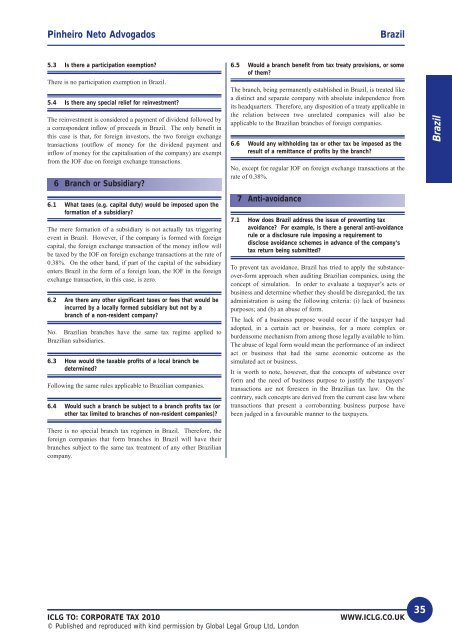Corporate Tax 2010 - BMR Advisors
Corporate Tax 2010 - BMR Advisors
Corporate Tax 2010 - BMR Advisors
You also want an ePaper? Increase the reach of your titles
YUMPU automatically turns print PDFs into web optimized ePapers that Google loves.
Pinheiro Neto Advogados<br />
Brazil<br />
5.3 Is there a participation exemption<br />
There is no participation exemption in Brazil.<br />
5.4 Is there any special relief for reinvestment<br />
The reinvestment is considered a payment of dividend followed by<br />
a correspondent inflow of proceeds in Brazil. The only benefit in<br />
this case is that, for foreign investors, the two foreign exchange<br />
transactions (outflow of money for the dividend payment and<br />
inflow of money for the capitalisation of the company) are exempt<br />
from the IOF due on foreign exchange transactions.<br />
6 Branch or Subsidiary<br />
6.1 What taxes (e.g. capital duty) would be imposed upon the<br />
formation of a subsidiary<br />
The mere formation of a subsidiary is not actually tax triggering<br />
event in Brazil. However, if the company is formed with foreign<br />
capital, the foreign exchange transaction of the money inflow will<br />
be taxed by the IOF on foreign exchange transactions at the rate of<br />
0.38%. On the other hand, if part of the capital of the subsidiary<br />
enters Brazil in the form of a foreign loan, the IOF in the foreign<br />
exchange transaction, in this case, is zero.<br />
6.2 Are there any other significant taxes or fees that would be<br />
incurred by a locally formed subsidiary but not by a<br />
branch of a non-resident company<br />
No. Brazilian branches have the same tax regime applied to<br />
Brazilian subsidiaries.<br />
6.3 How would the taxable profits of a local branch be<br />
determined<br />
Following the same rules applicable to Brazilian companies.<br />
6.4 Would such a branch be subject to a branch profits tax (or<br />
other tax limited to branches of non-resident companies)<br />
6.5 Would a branch benefit from tax treaty provisions, or some<br />
of them<br />
The branch, being permanently established in Brazil, is treated like<br />
a distinct and separate company with absolute independence from<br />
its headquarters. Therefore, any disposition of a treaty applicable in<br />
the relation between two unrelated companies will also be<br />
applicable to the Brazilian branches of foreign companies.<br />
6.6 Would any withholding tax or other tax be imposed as the<br />
result of a remittance of profits by the branch<br />
No, except for regular IOF on foreign exchange transactions at the<br />
rate of 0.38%.<br />
7 Anti-avoidance<br />
7.1 How does Brazil address the issue of preventing tax<br />
avoidance For example, is there a general anti-avoidance<br />
rule or a disclosure rule imposing a requirement to<br />
disclose avoidance schemes in advance of the company’s<br />
tax return being submitted<br />
To prevent tax avoidance, Brazil has tried to apply the substanceover-form<br />
approach when auditing Brazilian companies, using the<br />
concept of simulation. In order to evaluate a taxpayer’s acts or<br />
business and determine whether they should be disregarded, the tax<br />
administration is using the following criteria: (i) lack of business<br />
purposes; and (b) an abuse of form.<br />
The lack of a business purpose would occur if the taxpayer had<br />
adopted, in a certain act or business, for a more complex or<br />
burdensome mechanism from among those legally available to him.<br />
The abuse of legal form would mean the performance of an indirect<br />
act or business that had the same economic outcome as the<br />
simulated act or business.<br />
It is worth to note, however, that the concepts of substance over<br />
form and the need of business purpose to justify the taxpayers’<br />
transactions are not foreseen in the Brazilian tax law. On the<br />
contrary, such concepts are derived from the current case law where<br />
transactions that present a corroborating business purpose have<br />
been judged in a favourable manner to the taxpayers.<br />
Brazil<br />
There is no special branch tax regimen in Brazil. Therefore, the<br />
foreign companies that form branches in Brazil will have their<br />
branches subject to the same tax treatment of any other Brazilian<br />
company.<br />
ICLG TO: CORPORATE TAX <strong>2010</strong><br />
© Published and reproduced with kind permission by Global Legal Group Ltd, London<br />
WWW.ICLG.CO.UK 35
















